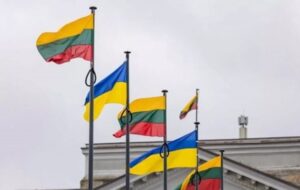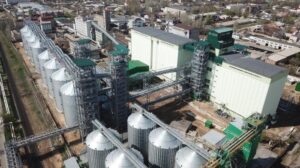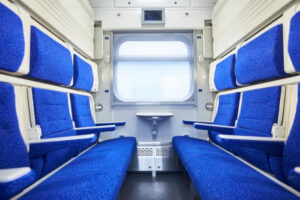
The production of Ukrainian weapons will be organized in Lithuania, according to an agreement reached at a meeting between the defense ministers of the two countries, the Lithuanian Defense Ministry’s press service reported on Tuesday.
“During the meeting between Lithuanian Minister of National Defense Dovilė Šakalenė and Ukrainian Minister of Defense Denys Shmyhal, a bilateral Protocol of Intent on the production of Ukrainian weapons in Lithuania was signed, and the types of weapons to be produced and further steps were discussed,” the ministry said in a statement on its website.
It is noted that the document “provides for joint production of defense industry products, technology transfer, project development, and localization of production in Lithuania.”
“This will pave the way for long-term partnership, strengthening collective European security, and creating sustainable supply chains,” the Lithuanian Ministry of Defense said.
According to Šakalėnė, Lithuania remains firmly committed to further supporting Ukraine. According to the minister, “in the coming years, it is planned to allocate more than EUR 200 million to support Ukraine for projects related to armaments, anti-drone systems, demining, rehabilitation, training, and support for Ukraine’s defense industry.” The Lithuanian Defense Minister also announced in Kyiv that Lithuania intends to contribute up to EUR 30 million to the PURL (Prioritized Ukraine Requirements List) initiative.
The minister also met with the leadership of the Ukrainian Air Force and air defense experts to discuss emerging challenges, lessons learned, and innovations in the field of air defense.
“We discussed Ukraine’s latest decisions in response to the changing situation with air threats and technological innovations. I want to ensure the most effective cooperation possible in strengthening our air defense and responding to the changing technologies and methods used by Russia. We agreed to hold regular expert consultations on the application of practical experience to strengthen our air defense,” Shakalene said.
According to her, “it is extremely important to strengthen airspace surveillance in order to detect Russian drones heading for Belarus as early as possible, which may subsequently violate Lithuanian airspace. To this end, it was agreed to exchange information between representatives of our air forces.”

South Korean corporation POSCO International plans to resume full operation of its grain terminal in Mykolaiv region, according to a press release from the Ministry of Economy, Environment, and Agriculture following a meeting between Minister Oleksiy Sobolev and business representatives during a working trip to Odesa.
The ministry specified that the meeting discussed the prospects for developing infrastructure for storing grain and vegetable products (storage facilities and cold rooms).
“The Ukrainian side emphasized the need to develop mechanisms to protect businesses in wartime and reduce the cost of marine insurance. At the same time, the government is working on a program to support the restoration of trade routes in the Mykolaiv region,” the statement said.
The Korean delegation, consisting of POSCO International Corporation Vice President Kim Young-hoon and POSCO International Ukraine Sales Director An Suk-hyun, noted the Ukrainian government’s cooperation with the Economic Development and Cooperation Fund (EDCF). Through the EDCF and KEXIM Bank programs, Korean companies have the opportunity to participate in the transformational reconstruction of Ukraine. This includes POSCO, which has experience in implementing infrastructure projects abroad.
One of the company’s priorities is the construction of an RDF-fueled (Refuse-derived fuel) thermal power plant in Odesa. Consultations with the city administration on environmental and energy efficiency issues have already been held. The project to build a CHP plant in Odesa has been tentatively included in the list of priorities.
“The project in Odesa is very important for our ministry because it combines an investment component with an environmental component. The initiative is aimed at protecting the environment and introducing modern technologies to reduce emissions. In the future, this practice can be extended to other regions of Ukraine. The Agency for Reconstruction is submitting this project to the Unified Project Portfolio of the State, and it is expected to be evaluated by experts and subsequently approved by the Strategic Investment Council,” Sobolev said.
Regarding the implementation of a joint project with JSC Ukrzaliznytsia – the construction of a railway depot – various mechanisms for attracting investment are currently being considered, in particular, public procurement and public-private partnership instruments. The first option opens up more opportunities for Korean companies to participate in Ukraine’s recovery, while the second option allows for the localization and involvement of Ukrainian manufacturers in the project as part of the “Made in Ukraine” state policy aimed at stimulating the development of national production.
GRAIN TERMINAL, MYKOLAIV REGION, ODESA, POSCO International, TPP

The National Agency for Asset Tracing and Management (ARMA) transferred more than $3.5 million from the sanctioned company ROYAL PAY EUROPE to the state budget, according to ARMA’s press service.
“These funds will be directed to the Fund for the Elimination of the Consequences of Armed Aggression and will be used for the restoration of the country: the construction of housing for those who have lost it, the restoration of infrastructure, the development of medical facilities, and the construction of protective structures,” the statement said.
According to reports, the exact amount is $3,572,585.29.
The press service notes that ARMA continues to ensure that seized and sanctioned assets benefit the state and bring victory closer.

Tech retailer Allo has opened Ukraine’s first official showroom for the Roborock home appliance brand, according to Allo’s director of development and format management, Mykola Astapov.
Roborock is a global leader in the vacuum cleaner category, having successfully integrated AI into its gadgets.
“Artificial intelligence has burst into our lives following the advent of a large number of smart gadgets. We work in a very interesting market, where devices are becoming “smarter” every day, helping users in their daily lives. Meet the first official Roborock Shop-in-Shop in Dnipro, based in the flagship Allo Makh store in Most City!” Astapov wrote on Facebook.
According to the Ukrainian Council of Shopping Centers, the Roborock showroom has its own sign and entrance inside the shopping center, with a 3-meter-long demonstration area and special flooring inside so that customers can test the brand’s vacuum cleaners.
Allo has been the official exclusive distributor of the Roborock brand in Ukraine since early 2025.
According to the website, as of August 2025, the chain has 286 stores in 118 cities in Ukraine.
Allo LLC was founded in 1998. According to Opendatabot, the participants of the LLC are PP Dniproinvest 2016 (95.19%), Dmytro Derevitsky (3.6%), and Maksym Raskin (1.21%). Derevitsky is listed as the ultimate beneficiary. Revenue for 2024 was UAH 10 billion 585.6 million, which is 38% more than in 2023, and net profit was UAH 27 million 133 thousand, which is 31.6% more than in 2023.

Ukrzaliznytsia (UZ), the monopoly railway operator, carried 639,700 passengers between August 18 and 24, which is 0.8% less than a week earlier, according to a statement by the company on Telegram.
“We are gradually coming out of the peak travel season, but we continue to provide detailed information on passenger traffic statistics!” wrote UZ CEO Oleksandr Pertsovskyi on his Facebook page.
Demand for the most popular route, Kyiv-Lviv, amounted to 128,000 requests last week, which is 15.2% less than the week before. The Kyiv-Odesa route received 71,700 requests, which is 22.3% less than during the period from August 11 to 17.
Demand for the Kyiv-Kharkiv route decreased by 8.6% to 63,300 searches, and for the Kyiv-Peremyshl route by 10.3% to 58,400.
According to statistics, the total volume of traffic still remains higher than last year: during the reporting week, the increase was 3.9% or 23,700 passengers.
The average number of passengers carried per car from August 18 to 24 was 467, which is 6.4% more than during the same period in 2024.
In addition, the number of passengers in children’s groups increased 1.3 times to 23,600, and the number of military personnel transported through the special reserve increased 2.4 times to 12,000.
As reported, in the first half of 2025, Ukrzaliznytsia increased passenger traffic by 1.2% compared to the first half of 2024, to 13.52 million. This is 23% more than in January-June 2023, Pertsovsky previously reported on Facebook.